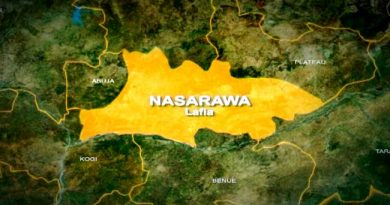UNICEF Fights Poverty With Cash
Cash grants by UK DFID and implemented by UNICEF are helping to address inequalities in some northern states.
Seven-year-old Muhammad Abbas has a dream to become a soldier. He lives in a region plagued by insecurity and a resistance to sending children, especially girls, to school. He has a dream to don the military fatigue when he grows up and help fight insecurity in the country.
He is presently in Primary Four in Kawara Model Primary School in Maiyama Local Government Area of Kebbi State.
“I am in class four and I want to become a soldier when I grow up,” he told this reporter in an interview during a visit to the school.
Mrs. Abbas has a strong will to see them through school because she did not attend school herself.
“I have never attended school but I want my children to go to school,” she said. Twenty-five year-old Mrs. Abbas was first given a cash grant of N32 000 to improve the education of her children. “I have four children in the school here. I have benefitted three times.
I got N32, 000 for the first consignment and N62, 000 for the second consignment. I bought school uniforms, biros and pencils for the children. I bought palm oil and I also keep a goat at home to be able to provide for unforeseen circumstances. In case I need to pay for their fees, I can sell the goat and pay their school fees,” she added.
The CTP is an initiative where N8, 000 is paid to a mother or caregiver each academic term per child to meet the child’s basic school needs with leftover stipend enough to finance a petty business. The aim is to help sustain the family and provide an income generating platform to continue sponsorship of the child in school.
It is a two-year programme, which is currently being implemented under the Girls Education Project Phase 3 (GEP3) to woo girls to attain basic education, while improving the socio-economic status of their families. It is targeted to reach half a million children who are missing education due to poverty, socio-cultural and economic barriers, by reducing the burden on parents in order to enhance enrolment and retainment levels in school.
CTP intervention has already changed the fortunes of some families in three states in northern Nigeria where it is being implemented. Because of this intervention, families in the three states of Kebbi, Zamfara and Sokoto, where the programme is being implemented, are singing a different song. The CTP has two components – the conditional cash transfer Programme (CCT) and the unconditional cash transfer project.
It is a success story for Asiya Abubakar, a mother of five and native of Danko village in Danko/Wasagu local government area of Kebbi state. She has been able to send her five kids to school while still improving the standard of living of the family through the intervention. She is one of the numerous beneficiaries of cash grant under the CCT intervention.
The general goal of the project is to ensure quantitative and qualitative basic education in the three states, increase enrollment, reduce poverty and contribute to the income of families.
According to an Educationist and Development Consultant for the UNICEF, Dr. Dayo Ogundimu, CTP contributes to poverty reduction in the family and the community.
He stated this during a two-day media dialogue on Cash Transfer Programme (CTP) organised by the United Nations Children Funds in collaboration with the Child Rights Information Bureau (CRIB) of the Federal Ministry of Information and Culture, in Birnin Kebbi, Kebbi state.
Most states in the region have low enrollment rate for girls. Out of the 10.2 million out-of-school children in the country, about 60 per cent are girls. This problem is more prevalent in the north. Experts have attributed mistrust of the intent and value of western education, high level of poverty prevalent in some communities in the north, and early marriage as some factors partly responsible for this.
Dr. Ogundimu said: “Cash Transfers are cash grants made to school age children (especially the girl-child) to enable them enroll, stay in school and complete their education.
“Also, cash grants help the beneficiaries to pay for things that are essential for their schooling – books, writing materials, fees, etc.
“On a global scale, cash transfers contribute to poverty reduction in the family and the community.
“The Conditional Cash Transfer (CCT) provides financial support to families for specific purpose, e.g. to ensure proper school participation by school-age children (especially the girl-child).
”CCTs protect educational investment in the girl-child today in order to alleviate future poverty.”
The education expert identified poverty and early child marriage as some factors affecting girl-child education in Nigeria and other African countries.
Dr. Ogundimu, who is also the Principal Consultant, ComForch Development Communications, said these factors posed a serious challenge to girl-child education in the country, especially in the north.
Ogundimu said: “In Nigeria and other developing countries, poverty is a critical barrier to the girl-child education.”
The State Project Coordinator, Educate -A-Child/UNICEF, Kebbi state, Isah Usman, said that the CTP has started addressing some of the underlying causes of inequalities in education outcomes, such as poverty, social exclusion and malnutrition.
“Cash Transfer Programme is addressing some of the underlying causes of inequalities in Education outcomes, such as poverty, social exclusion and malnutrition. A regular source of income allows extremely poor households to eat better food more regularly, leading to improved nutritional status. Improved nutrition in young children will in turn benefit their health, and is important for children’s cognitive development and ability to benefit meaningfully from school.
“To change the situation and contribute to a greater reduction of the number of children out of school, UNICEF proposes the expansion of the Girls Education Project Phase 3 (GEP3), funded by the UK Department of International Development, in partnership with EAC.
“The proposed interventions under the partnership with EAC are in line with UNICEF’s vision and mission of the realisation of children’s rights including their right to education and with EAC’s mission, vision and goals, focusing on out-of-school children and quality education for them,” he said.
Also, the State Project Coordinator, ECA/UNICEF, Kebbi state, Isah Usman said the goal of the EAC/CTP project is to expand access to basic education to 501, 749 children out of the 10.2 million out- of -school children in Kebbi, Sokoto and Zamfara states by 2020.
He said 41, 391 children had so far benefitted from the intervention programme by UNICEF in Kebbi state.
According to him, Kebbi and Zamfara states are considered as educationally disadvantaged states in the country, thus the various interventions by UNICEF.
“To change this ugly situation, UNICEF has contributed to the expansion of girl education through its Girls Education Project (GEP -Phase 3) 1, 2 and 3 projects.
“This is done through reduction in the poverty level by expanding the education level of the girl child as many parents cannot afford the education of their children.
“The overall goal of EAC is to expand access to quality basic education for 501,749 out-of-school children by 2020 in Katsina, Sokoto, Kebbi and Zamfara state.
“The cash transfer intervention under the EAC aims to reach 41, 391 child beneficiaries and their female caregivers in four years, 31, 044 in Kebbi State and 10, 347 in Zamfara State.




